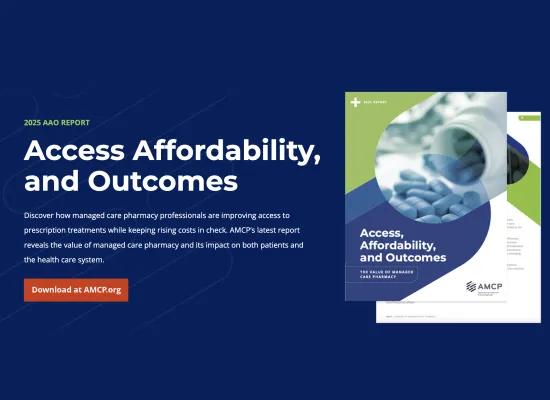
January Issue of AMCP’s Journal of Managed Care & Specialty Pharmacy Focuses on MTM Research
Alexandria, Va., Jan. 8, 2016 — The current issue of the Journal of Managed Care & Specialty Pharmacy (JMCP) features valuable new research on the practice of medication therapy management (MTM) and related pharmacist interventions, topics that to date have remained relatively understudied. JMCP is published by the Academy of Managed Care Pharmacy.
Articles in this month’s JMCP include an examination of factors associated with provider acceptance of pharmacist recommendations; the impact of MTM on adherence and inappropriate medication use; and the development and validation of a patient satisfaction survey for MTM, emphasizing the importance of the patient perspective in managed care pharmacy.
The concept of pharmacist-led pharmaceutical care matured in 2003 with passage of the Medicare Modernization Act, which made MTM a reimbursable service mandatory for Medicare Part D plans, says JMCP Editor in Chief Laura E. Happe, PharmD, MPH.
“This legislation opened up a new dimension in managed care pharmacy that put pharmacists in direct contact with patients and practicing to the top of their license,” she explains. “With the recognition and reimbursement of the pharmacist’s cognitive services comes responsibility. It is incumbent upon our profession to generate the data to support the future of MTM and other pharmacist interventions, a responsibility that we have not always excelled at.”
Happe notes that last year the Agency for Healthcare Research and Quality (AHRQ) published a systematic review of MTM evidence in JAMA Internal Medicine. The review identified 44 eligible studies and concluded that there is insufficient evidence to determine the effect of MTM on most outcomes because of inconsistencies and imprecision in the studied populations and interventions.
“While the review’s conclusions have been debated and scrutinized, it is nevertheless clear that research evaluating outcomes of MTM are still somewhat scarce in the literature,” she says.
In preparing the first JMCP issues of 2016, Happe noticed that researchers had submitted several MTM and related studies—allowing JMCP to do a themed issue on the topic. “There was no call for papers on the topic, suggesting that the managed care pharmacy community is inherently interested or perhaps even responding to the call to action from AHRQ’s review,” she says.
Abstracts and the full articles are available at www.jmcp.org. Select studies in the January 2016 issue include:
“Evaluating Pharmacist-Written Recommendations to Providers in a Medicare Advantage Plan: Factors Associated with Provider Acceptance”
What this study adds:
- This retrospective study is the first to examine the acceptance of pharmacist recommendation letters by providers within a Medicare Advantage Plan, with the purpose of identifying factors associated with provider acceptance of pharmacist recommendations. Approximately 50% of recommendations were accepted by providers overall, with significantly less recommendations accepted for heart failure as compared with those for diabetes, identifying a potential need to educate physicians regarding heart failure medications.
“Maintenance of Clinical Endpoints After Discharge from a Pharmacist-Managed Risk Reduction Clinic at a Veterans Affairs Medical Center”
What this study adds:
- This study demonstrates that overall, A1c, LDL, and systolic BP rose after discharge from the pharmacist-managed Risk Reduction Clinic (RRC), but these changes may not have been clinically significant based on the low reconsultation rate and the fact that levels remained close to generally accepted therapeutic goals.
- This quality management study indicates that patients likely to benefit from extending Charles George Veterans Affairs Medical Center RRC services past goal attainment include those with higher A1c and LDL at the time of consultation and those with higher weight.
“Accepting Medication Therapy Management Recommendations to Add ACEIs or ARBs in Diabetes Care”
What this study adds:
- Specific patient characteristics and communication methods may lead to higher acceptance rates of adding an ACEI/ARB medication.
- Compared with sending only a provider fax, patients who received all 3 types of contact (provider fax with patient phone call and letter) were estimated to be 1.34 times more likely (34% increase) to have an ACEI/ARB added as recommended.
- Patients who received recommendations by patient letters were 1.32 times more likely (32% increase) to have an ACEI/ARB added than recommendations communicated by provider faxes.
“Development and Validation of a Patient Satisfaction Survey for Comprehensive Medication Management”
What this study adds:
- This study describes the development and validation of a patient satisfaction tool for comprehensive medication management services.
- The tool development used collaborative input from administrators, practitioners, patients, student pharmacists, university faculty, and a health literacy committee.
Featured News & Resources
See Full CalendarAward Applications Open
AMCP eLearning Day: Nexus Encore
AMCP 2026 Registration Opens
Upcoming Events
AMCP offers a wide variety of educational opportunities, from events and webinars to online training.







